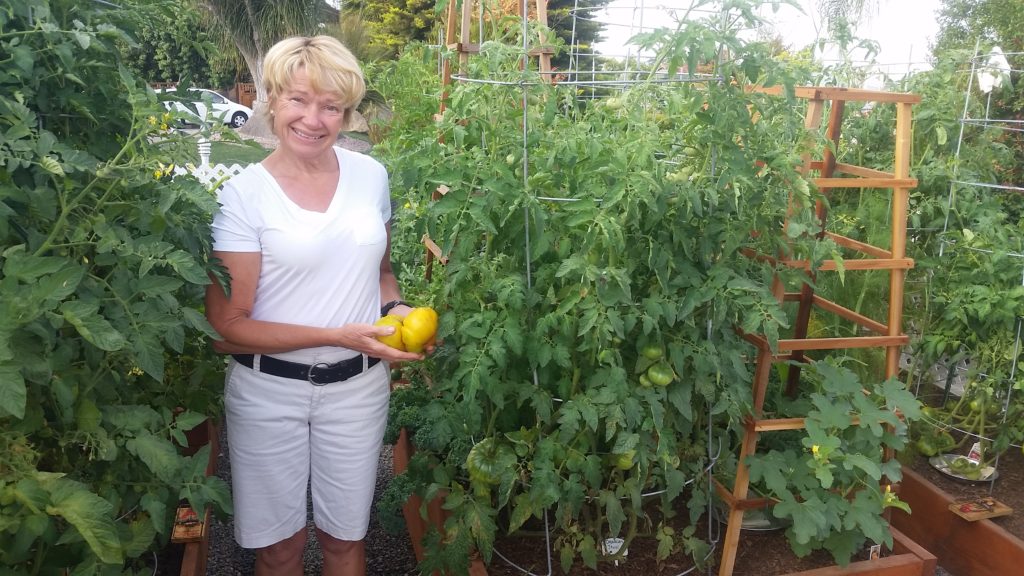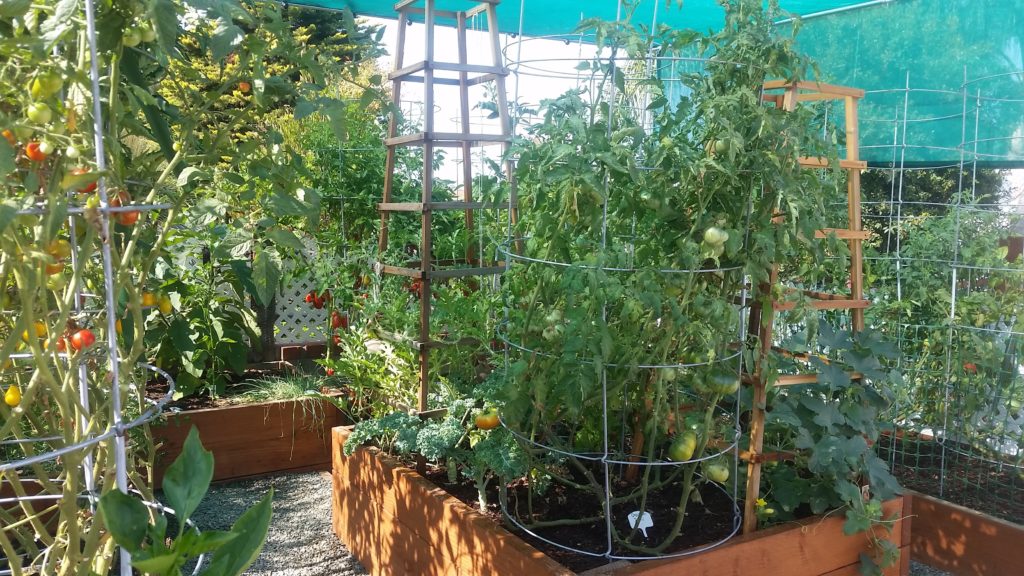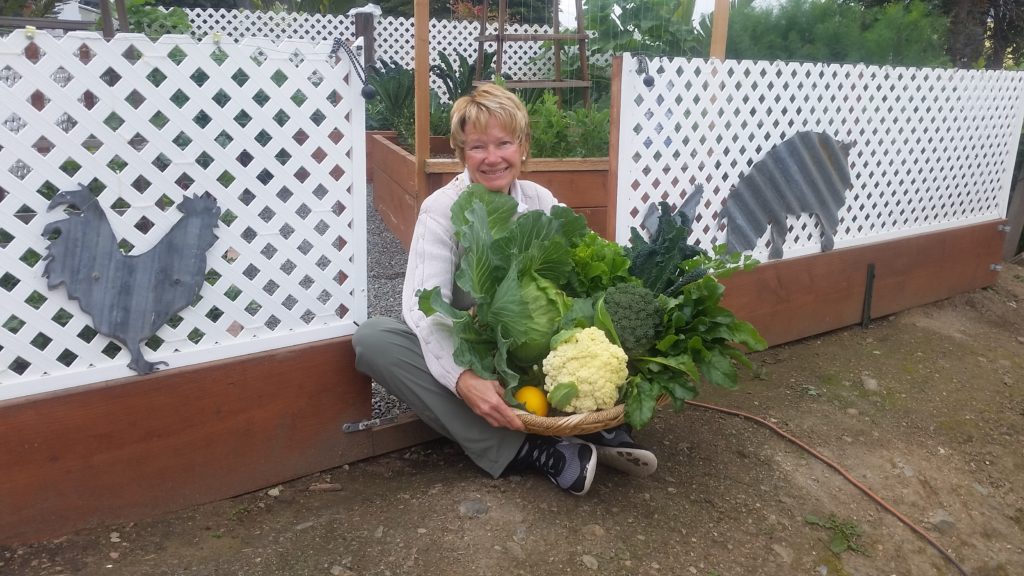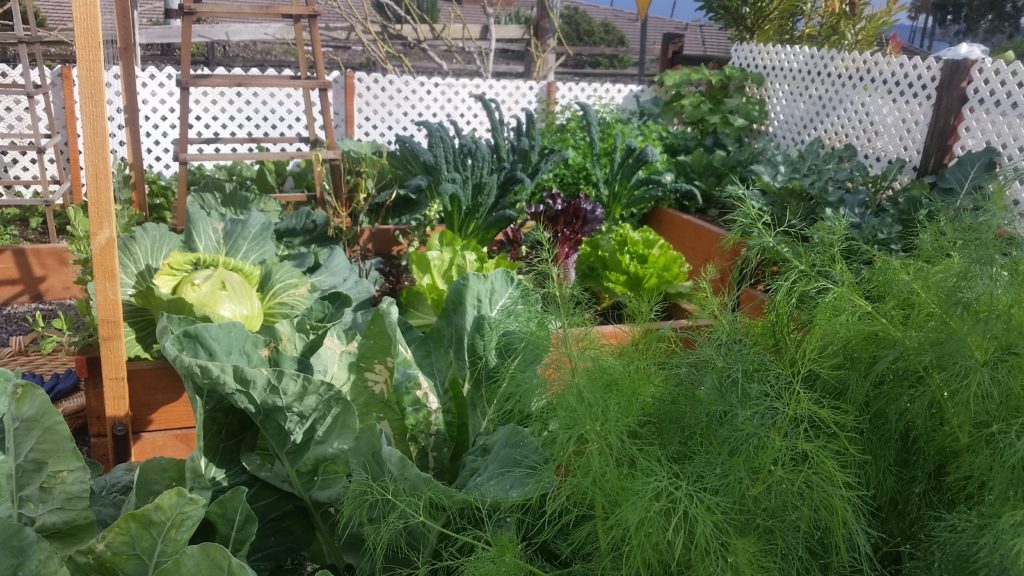Featured Farmer:
Nancy Bailey from Honey Hill Farm
Editor’s note: Nancy was also a guest on The Urban Farm Podcast! Learn more about Nancy’s story here.
Tell me a little about your urban farm. What’s its name? Size?
My “farm” consists of 170 square feet of raised beds. We designed the space to have beds arranged in a U-shape with a center raised bed and walkways that make it easy to access all corners of the garden without stepping inside a bed.
I affectionately call our garden Honey Hill Farm because my husband and I live at the top of a hill and Honey our beloved dog oversees all activity in and out of the garden.
What are you growing?
I have two planting seasons. In the summer I grow tomatoes, peppers, eggplant, zucchini and melons and in the winter I raise broccoli, cauliflower, cabbage, beets, Brussels sprouts, lettuces, arugula, kale and a myriad of herbs. Not everything has been successful but I’m happy with most of my yields. I keep a gardening journal and each season the “farm” has been increasingly productive.
What kind of climate are you growing in?
Mediterranean – southern CA
What initially got you interested in urban farming?
I grew up in western NY State in a farming family. My grandfather next door raised chickens and a few head of beef cattle, my dad tended to a large vegetable garden and my mom preserved all the produce he raised so I guess farming is in my DNA. I got serious about growing vegetables 2 ½ years ago after I retired.
Do you use any organic, permaculture, hydroponic, biodynamic, or other methods? Explain.
My vegetable garden is organic with vermiculture amendments.
Do you use compost? Where do you get it and how does it help your plants?
I have two bins where I make my own compost. I use one bin to make a compost from leaf mold which I use as a rich amendment in the vegetable garden and the other bin to decompose woody material which I use as mulch for top dressing. I’ve learned that 3-4 inches of mulch dramatically helps retain water during the hot summer months in southern CA. I use a moisture meter which helps me to know when it’s necessary to water.
Each season I remove 25% of the planting medium in the vegetable garden and move it to my ornamental horticulture beds then heavily amend the vegetable beds with compost, worm castings and rock dust before replanting.
Do you have any urban livestock? Chickens? Bees?
Sadly no, but I lust after chickens.
What do you do with the food you grow?
I share it with the neighborhood. Although my planting space is small, my garden is prolific and I raise far more produce than my husband and I can consume.
What is your greatest challenge in your farming endeavors?
Critters! Two years ago we shoveled out and sifted by hand all the dirt in the raised beds to remove an infestation of more than 2000 June beetle larva! I was unwilling to use a chemical to kill the grubs because the garden is organic and I want to encourage earthworms.
Also two years ago I lost much of my winter cole crop over the course of only a few nights when a gopher tunneled under one of the beds and pulled several broccoli and Brussel sprouts plants underground and out of sight! To solve that problem, when we redesigned the garden last year we installed hardware cloth under the pathways and beds and we haven’t had a gopher invasion since.
A few months ago either a rat or a squirrel scaled the perimeter lattice fence around the “farm” and devoured the growth stalk on 11/12 of my broccoli plants. My husband remedied that problem by installing a hot wire and a ground wire around the top of the lattice which works much as a livestock electric fence does in this case to deter climbing critters. I replanted the broccoli. It’s been a battle with the beasts but I think we’re winning.
What do you enjoy the most about farming/growing food?
It’s very satisfying to watch young plants grow, mature and produce. It’s thrilling when a tiny melon appears or a cauliflower head peeks out from the leaves! I intentionally didn’t install an irrigation system in the garden because I enjoy spending time there observing the changes when I’m watering by hand. It pleases me enormously to harvest my vegetables and I love sharing them with appreciative friends. I have a real sense of community when I’m delivering baskets of vegetables in the neighborhood. Also, I’m a complete foodie and I love cooking with produce from our garden.
Why do you think urban farming is important?
It’s important to be connected to the earth, to have a place to get our hands dirty and to watch the miracle that happens when a seed propagates, grows and produces a harvest. Perhaps urban farming is even more important today when so many of us work in high stress jobs or commute great distances back and forth to work. No matter the size of the farm, the act of planting a garden and growing our own food is infinitely rewarding.
Do you think this is a growing movement?
I hope so.
Is urban farming the future of agriculture?
I don’t think urban farming will ever replace the need for commercial bulk growers but I think more people are paying attention to non-GMO and organic options so I expect an upsurge in urban farming.
Do you have any advice for someone that’s just getting started?
I wouldn’t take shortcuts when it comes to critter-proofing a garden. I think it’s important to know before you plant which variety of varmints could possibly decimate your garden. Take whatever steps are necessary to prevent losing a harvest.
Also, in my climate I learned the importance of installing a removable sun shade to protect the summer garden from intense heat.
Anything else you’d like to add?
Each year I try to up my game in the garden and this year I’m looking forward to growing my heirloom tomatoes from seed and learning how to graft them onto a robust rootstock.
In a few days I’m starting a 6 week Master Composter class. It should be interesting to see which direction that takes me.
Also, after watching the Urban Farm U podcast I’ve been inspired to start my own backyard orchard! I’ll spend time this year preparing the soil and building gopher cages so that by next Spring I’ll be ready to plant bare root stock.
*Disclosure:
Some of the links in our podcast show notes and blog posts are affiliate links and if you go through them to make a purchase, we will earn a nominal commission at no cost to you. We offer links to items recommended by our podcast guests and guest writers as a service to our audience and these items are not selected because of the commission we receive from your purchases. We know the decision is yours, and whether you decide to buy something is completely up to you.









Enjoyed your writeup and descriptions. We tooare in SoCal in Corona area following similar paths and trying to take greens longer into summer with shade. Our community garden is enclosed with two layers of chicken wire and beds underplayed with hardware cloth. Birds and mice still get through! Thanks